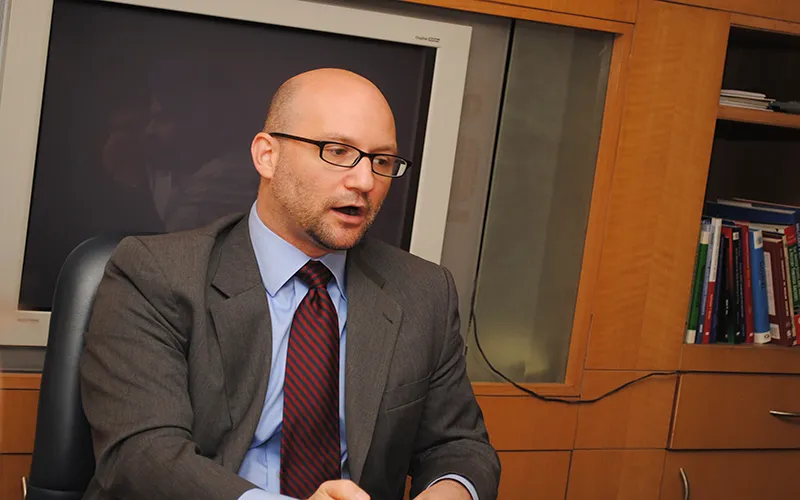-
CENTRES
Progammes & Centres
Location
The elimination of militant groups in Pakistan is a long and painful 'disposal process' but the State of Pakistan is not willing to face up to this challenge, says Prof. Stephen Tankel of the American University, an expert on Pakistan.

While geopolitical utility of militant groups is the principal reason for Pakistan’s failure to counter terrorist violence inside its territory, it is not the only reason, according to an expert on Pakistan, Stephen Tankel, Assistant Professor at the American University and a scholar in the South Asia programme at the Carnegie Endowment for International Peace.
Delivering a talk at Observer Research Foundation, Prof. Tankel said trends of evolution from 2001 onwards have led to a ’Petri dish’ effect, as government pressure and the State’s perceived ’betrayals of Jihad’ broke down the walls that separated different groups and led aspiring jihadis to join extremist groups regardless of their political objective. This has limited the Pakistani State’s ability to control these actors. Reluctance to crack down on these groups is also due to the fear that they would splinter into smaller units, in turn, making them more difficult to manipulate, Prof. Tankel said.
Prof. Tankel pointed out that some militant organisations also serve as proxies for use at home and against outside powers. The perception of military and civilian elites that they can be controlled further contributes to a strong sense of ambivalence, he added.
Despite the bleak situation, Prof. Tankel, also an adjunct staff member at the RAND Corporation, doubts the ability of the groups to overthrow the State, but does point out that their actions distract the State from addressing pressing problems of economy and other important issues.
He said starting with the Pakistani government’s siding with the USA after 9/11, there were a series of perceived betrayals in the eyes of radical groups on the part of the State. This motivated a number of terrorist attacks within Pakistan. The attacks halted, and these groups were allowed to regenerate, some even with State sponsorship. However, two assassination attempts on former President Pervez Musharraf in 2003 led to the first ’real crackdown’ upon militants, Prof. Tankel pointed out.
He pointed out that concurrently, peace dialogues with India in 2004 and the London bombing of 2005 generated greater international pressure on Pakistan to increase its counter-terrorism mandate. Subsequently, the army launched a series of unsuccessful military operations in the tribal areas, resulting in a spate of peace deals. In this backdrop, the Lal Masjid incidence in Islamabad was a watershed event and united previously diverse militant groups against the State. A violent insurgency, previously confined to the Federally Administrated Tribal Areas was brought to the ’establishment’s doorstep’ with large number of bombings in Punjab, he said.
Prof. Tankel said as a result of these dramatic changes, terrorist recruitment became a covert activity, forcing aspiring jihadis to base their selection of militant group on ease of access rather than political motivation. While the ’Petri dish’ effect caused an amalgamation of diverse groups, the ’Flea Market’ effect that followed, saw jihadis bouncing from one organisation to the next as ideological sanctions for their beliefs became readily available once they entered the system.
He said this multiplicity of jihads, be it against ’infidels in Afghanistan’, against India, the West or even the Pakistani State itself greatly decreased the ability of the State to identify and control these actors. Pakistan’s practice of relying on the ’emir’ or chief of a group to control its cadre was no longer relevant as the emirs were themselves unaware of the cadres joining anti-State splinter groups, even as they continued to use the parent groups’ resources.
With regard to the present political situation, Prof. Tankel pointed out the new feeling of ’Islamo-nationalism’ which the Imran Khan led Tehreek-e-Insaf espouses. He also discussed the recent process of political power having passed from above, as in the authoritarian structure, to the people. He qualified this recent phenomenon by adding that the ’bottom upwards’ power is not being realised as institutions such as the media continue to be manipulated by the elite.
Prof. Tankel concluded that the elimination of these groups is a long and painful ’disposal process’ and that Pakistan is not willing to face up to. However, this debilitating feature of militancy should not be conflated with alarmist projections of the overthrow of the State.
(This report is prepared by Ria Kapoor, Research Intern at Observer Research Foundation)
The views expressed above belong to the author(s). ORF research and analyses now available on Telegram! Click here to access our curated content — blogs, longforms and interviews.